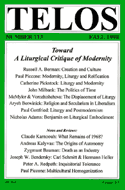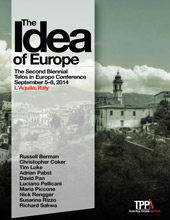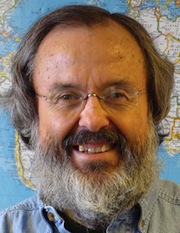By Telos Press · Wednesday, October 8, 2014 At the recent Telos Conference in L’Aquila, Italy, Associate Editor Adrian Pabst discussed his new article “Commonwealth and Covenant: The West in a Neo-Medieval Era of International Affairs,” which appears in Telos 168 (Fall 2014), a special issue on the theme of “The West: Its Past and Its Prospects.” Telos 168 is now available for purchase in our online store.
Continue reading →
By Lewis West · Tuesday, October 7, 2014  When Karl Marx described the commodity, he invoked the language of faith. For him, the commodity remained “a very strange thing, abounding in metaphysical subtleties and theological niceties.”[1] Marx, a dedicated secular economist, hesitated to pinpoint the exact power of the commodity. He could not fully understand it without recourse to a mythology he abhorred, one that far predated his radical recasting of accepted historical narratives. Here religion colors economics: the logic of exchange resembles a curious mysticism. When Karl Marx described the commodity, he invoked the language of faith. For him, the commodity remained “a very strange thing, abounding in metaphysical subtleties and theological niceties.”[1] Marx, a dedicated secular economist, hesitated to pinpoint the exact power of the commodity. He could not fully understand it without recourse to a mythology he abhorred, one that far predated his radical recasting of accepted historical narratives. Here religion colors economics: the logic of exchange resembles a curious mysticism.
Continue reading →
By Telos Press · Monday, October 6, 2014 Telos Press Publishing is pleased to announce that Matthias Küntzel’s Germany and Iran: From the Aryan Axis to the Nuclear Threshold is now available for pre-order. The book will be released on November 1, 2014. Pre-order your copy today, and we will ship it as soon as it is in stock.
Continue reading →
By Mario Bosincu · Thursday, October 2, 2014 The following paper was presented at the recent Telos in Europe conference on “The Idea of Europe,” held in L’Aquila, Italy, on September 5–8, 2014.
 In a paragraph of Daybreak, Nietzsche spoke of Romanticism’s “great reaction”[1] to the Enlightenment. Zeev Sternhell has brought out two distinctive elements of this centuries-long European revolt against the “rationalist modernity”:[2] the rejection of the claim to “mold people’s lives” by means of enlightened reason, and the reevaluation of faith as “an essential foundation of society”[3] accompanied by the idealization of the spiritually united medieval civilization as contrasted with the atomized modern society in the grip of decadence. This current of thought was the symptom of the crisis of the pre-Enlightenment traditional societies, described by Professor Pellicani as closed, static, rigidly prescriptive cultural universes in which, to cite Jaspers, “everything is under the control of symbols of being, held fast in unquestioned orders.”[4] The anti-Enlightenment movement aimed precisely at refounding these collapsed civilizations. One thinks of Novalis’s picture of medieval Europe pacified by the all-binding force of Christendom embodied by the clergy exercising a pastoral power in order to reshape men into salvation-worthy subjects. In a paragraph of Daybreak, Nietzsche spoke of Romanticism’s “great reaction”[1] to the Enlightenment. Zeev Sternhell has brought out two distinctive elements of this centuries-long European revolt against the “rationalist modernity”:[2] the rejection of the claim to “mold people’s lives” by means of enlightened reason, and the reevaluation of faith as “an essential foundation of society”[3] accompanied by the idealization of the spiritually united medieval civilization as contrasted with the atomized modern society in the grip of decadence. This current of thought was the symptom of the crisis of the pre-Enlightenment traditional societies, described by Professor Pellicani as closed, static, rigidly prescriptive cultural universes in which, to cite Jaspers, “everything is under the control of symbols of being, held fast in unquestioned orders.”[4] The anti-Enlightenment movement aimed precisely at refounding these collapsed civilizations. One thinks of Novalis’s picture of medieval Europe pacified by the all-binding force of Christendom embodied by the clergy exercising a pastoral power in order to reshape men into salvation-worthy subjects.
Continue reading →
By Telos Press · Wednesday, October 1, 2014 In this short video, filmed at the recent Telos Conference in L’Aquila, Editor Russell A. Berman talks about the central themes and concerns of Telos 168 (Fall 2014): The West: Its Past and Its Prospects. We have posted Russell’s full introduction here, and you can order your copy of the issue in our online store.
Continue reading →
By Telos Press · Monday, September 29, 2014  Congratulations to our own Tim Luke on receiving the American Political Science Association’s Charles A. McCoy Career Achievement Award, in honor of his many outstanding accomplishments as a writer, teacher, and activist. First starting with Telos as an intern back in 1975, Tim has been with the journal ever since, serving as an Associate Editor from the early 1980s on and as Telos Press Publishing’s Book Line Editor since 2005. In the latter role, Tim has overseen the publication of numerous Telos Press books, including the anthology A Journal of No Illusions: Telos, Paul Piccone, and the Americanization of Critical Theory, which he also coedited with Ben Agger. Virginia Tech, where Tim is University Distinguished Professor of Political Science as well as chair of the Department of Political Science, has a terrific write-up at their website, and we encourage everyone to read it. Congratulations to our own Tim Luke on receiving the American Political Science Association’s Charles A. McCoy Career Achievement Award, in honor of his many outstanding accomplishments as a writer, teacher, and activist. First starting with Telos as an intern back in 1975, Tim has been with the journal ever since, serving as an Associate Editor from the early 1980s on and as Telos Press Publishing’s Book Line Editor since 2005. In the latter role, Tim has overseen the publication of numerous Telos Press books, including the anthology A Journal of No Illusions: Telos, Paul Piccone, and the Americanization of Critical Theory, which he also coedited with Ben Agger. Virginia Tech, where Tim is University Distinguished Professor of Political Science as well as chair of the Department of Political Science, has a terrific write-up at their website, and we encourage everyone to read it.
Continue reading →
|
|
 When Karl Marx described the commodity, he invoked the language of faith. For him, the commodity remained “a very strange thing, abounding in metaphysical subtleties and theological niceties.”[1] Marx, a dedicated secular economist, hesitated to pinpoint the exact power of the commodity. He could not fully understand it without recourse to a mythology he abhorred, one that far predated his radical recasting of accepted historical narratives. Here religion colors economics: the logic of exchange resembles a curious mysticism.
When Karl Marx described the commodity, he invoked the language of faith. For him, the commodity remained “a very strange thing, abounding in metaphysical subtleties and theological niceties.”[1] Marx, a dedicated secular economist, hesitated to pinpoint the exact power of the commodity. He could not fully understand it without recourse to a mythology he abhorred, one that far predated his radical recasting of accepted historical narratives. Here religion colors economics: the logic of exchange resembles a curious mysticism.  In a paragraph of Daybreak, Nietzsche spoke of Romanticism’s “great reaction”[1] to the Enlightenment. Zeev Sternhell has brought out two distinctive elements of this centuries-long European revolt against the “rationalist modernity”:[2] the rejection of the claim to “mold people’s lives” by means of enlightened reason, and the reevaluation of faith as “an essential foundation of society”[3] accompanied by the idealization of the spiritually united medieval civilization as contrasted with the atomized modern society in the grip of decadence. This current of thought was the symptom of the crisis of the pre-Enlightenment traditional societies, described by Professor Pellicani as closed, static, rigidly prescriptive cultural universes in which, to cite Jaspers, “everything is under the control of symbols of being, held fast in unquestioned orders.”[4] The anti-Enlightenment movement aimed precisely at refounding these collapsed civilizations. One thinks of Novalis’s picture of medieval Europe pacified by the all-binding force of Christendom embodied by the clergy exercising a pastoral power in order to reshape men into salvation-worthy subjects.
In a paragraph of Daybreak, Nietzsche spoke of Romanticism’s “great reaction”[1] to the Enlightenment. Zeev Sternhell has brought out two distinctive elements of this centuries-long European revolt against the “rationalist modernity”:[2] the rejection of the claim to “mold people’s lives” by means of enlightened reason, and the reevaluation of faith as “an essential foundation of society”[3] accompanied by the idealization of the spiritually united medieval civilization as contrasted with the atomized modern society in the grip of decadence. This current of thought was the symptom of the crisis of the pre-Enlightenment traditional societies, described by Professor Pellicani as closed, static, rigidly prescriptive cultural universes in which, to cite Jaspers, “everything is under the control of symbols of being, held fast in unquestioned orders.”[4] The anti-Enlightenment movement aimed precisely at refounding these collapsed civilizations. One thinks of Novalis’s picture of medieval Europe pacified by the all-binding force of Christendom embodied by the clergy exercising a pastoral power in order to reshape men into salvation-worthy subjects.  Congratulations to our own Tim Luke on receiving the American Political Science Association’s Charles A. McCoy Career Achievement Award, in honor of his many outstanding accomplishments as a writer, teacher, and activist. First starting with Telos as an intern back in 1975, Tim has been with the journal ever since, serving as an Associate Editor from the early 1980s on and as Telos Press Publishing’s Book Line Editor since 2005. In the latter role, Tim has overseen the publication of numerous Telos Press books, including the anthology
Congratulations to our own Tim Luke on receiving the American Political Science Association’s Charles A. McCoy Career Achievement Award, in honor of his many outstanding accomplishments as a writer, teacher, and activist. First starting with Telos as an intern back in 1975, Tim has been with the journal ever since, serving as an Associate Editor from the early 1980s on and as Telos Press Publishing’s Book Line Editor since 2005. In the latter role, Tim has overseen the publication of numerous Telos Press books, including the anthology 

